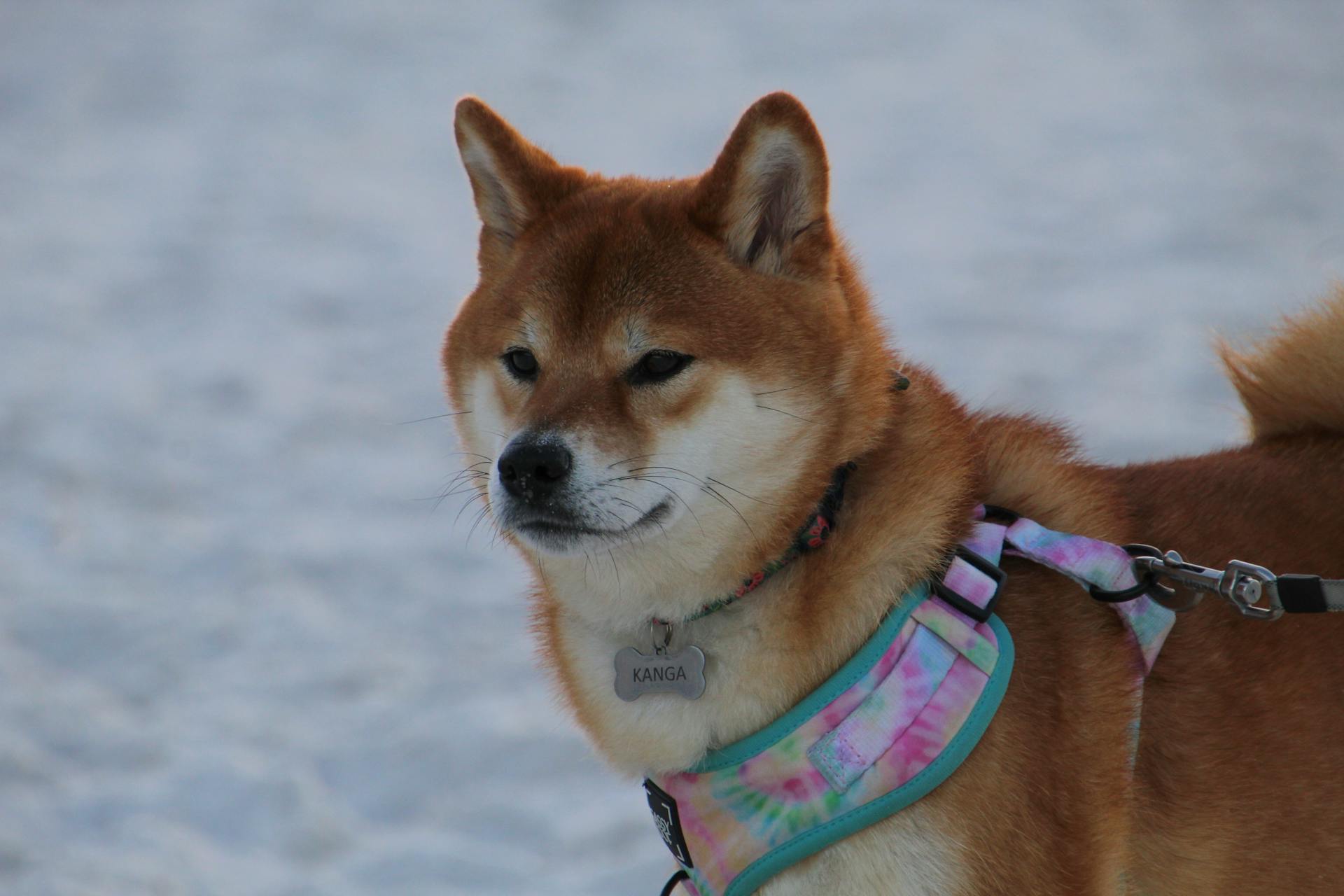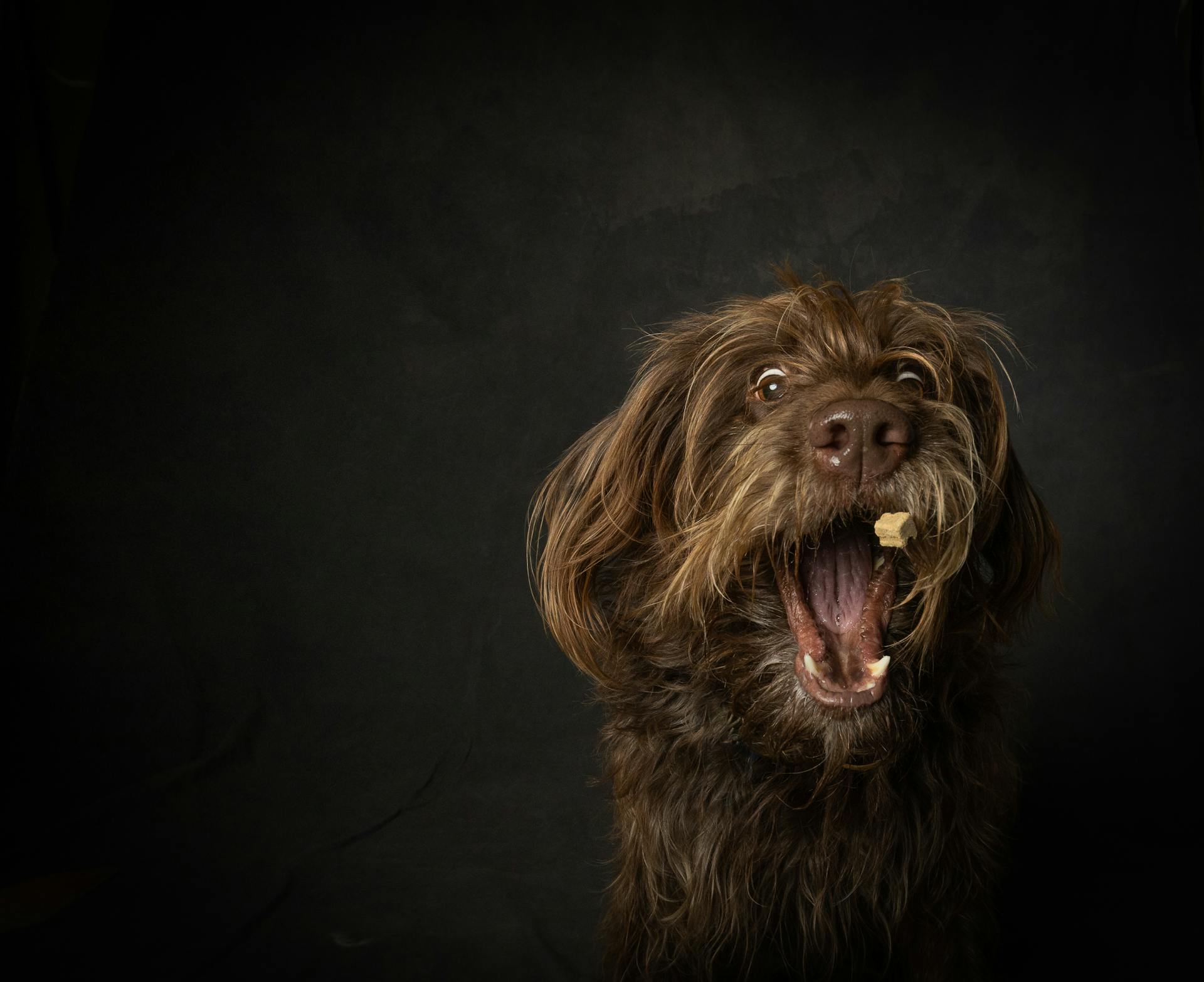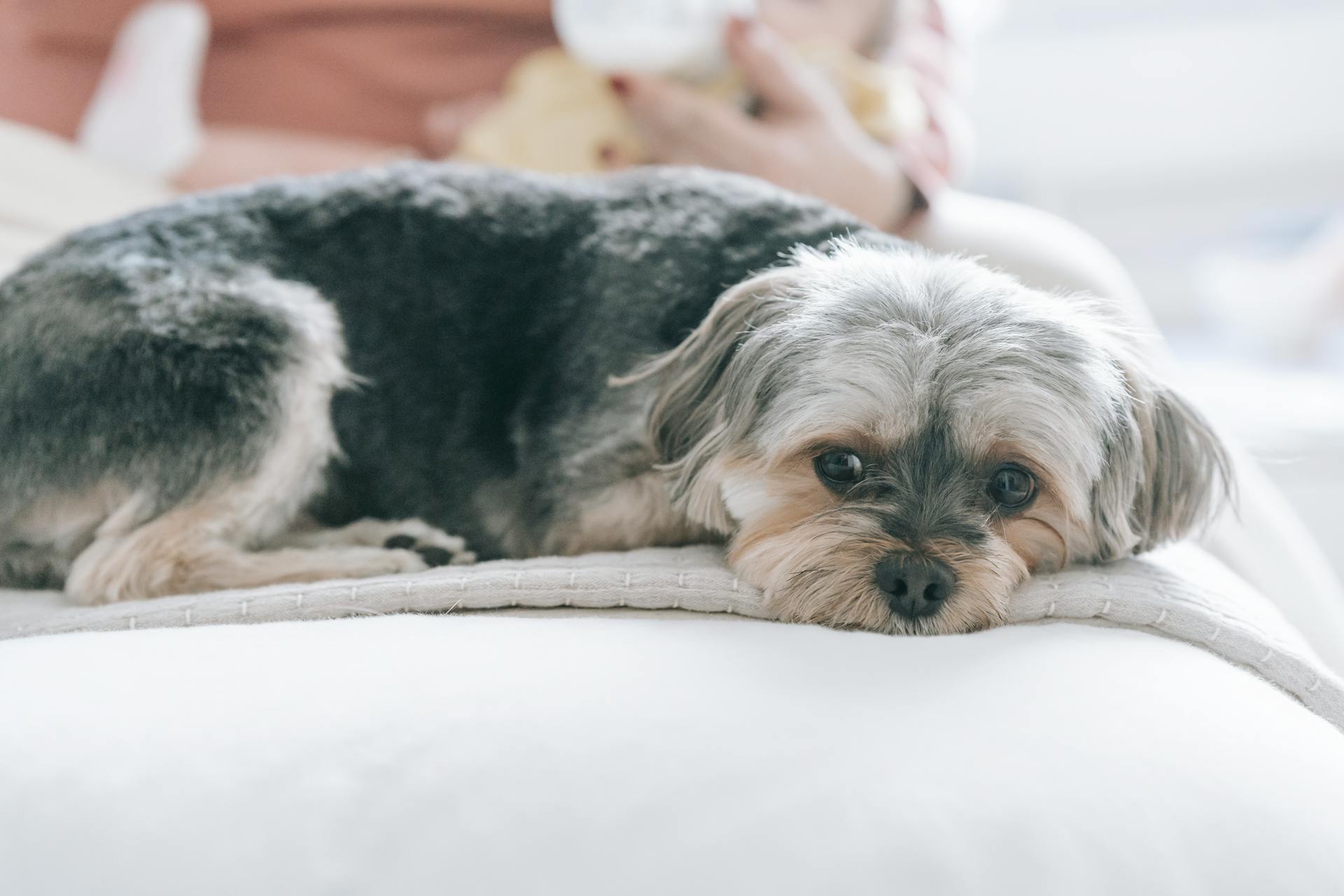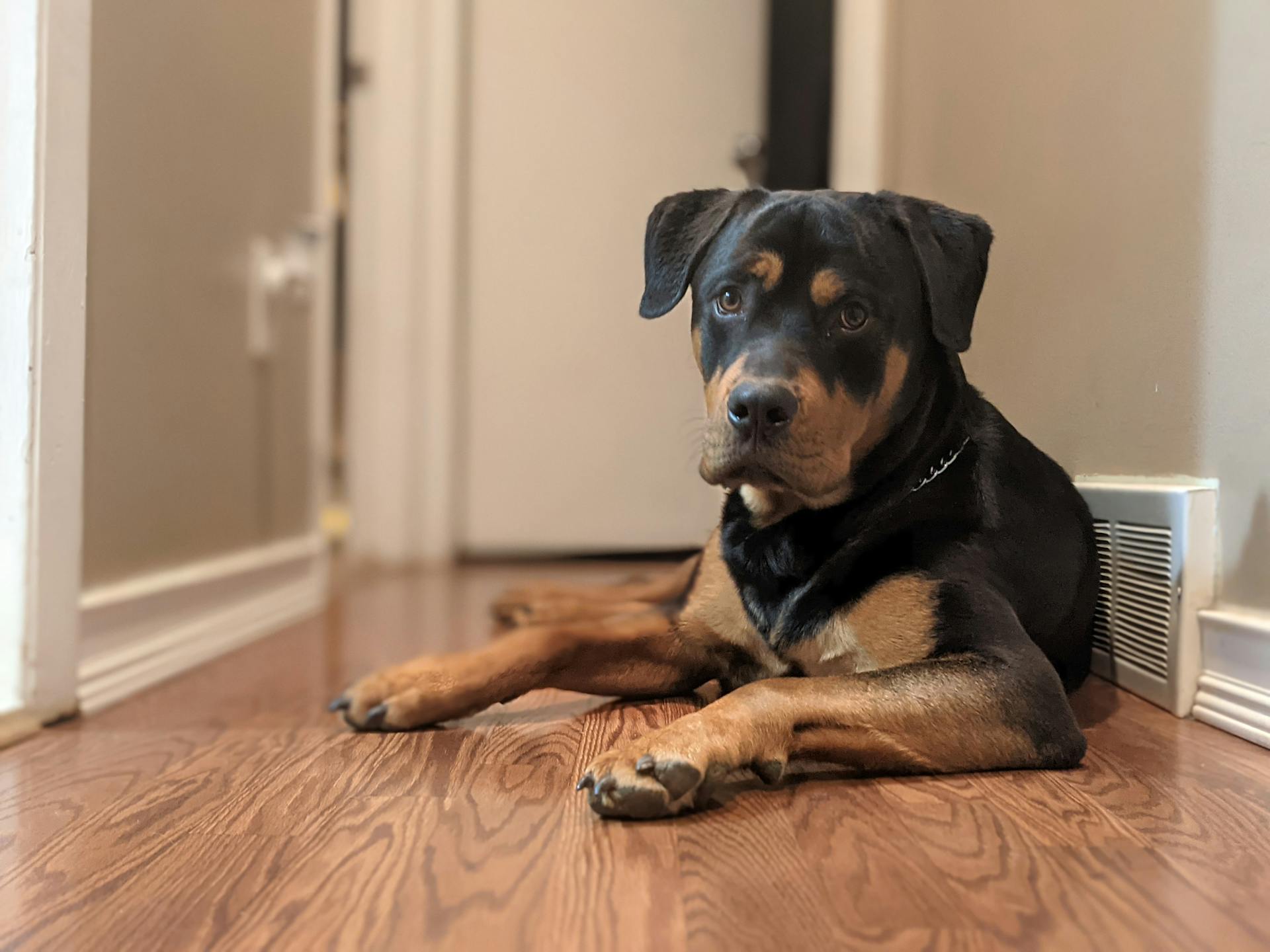
Shiba Inus are known for their unique characteristics, and their dietary needs are no exception. A balanced diet is crucial for maintaining their overall health.
Shiba Inus are prone to obesity, so it's essential to monitor their food intake. A healthy weight range for Shiba Inus is between 15-25 pounds.
A Shiba Inu's diet should consist of high-quality protein sources, such as chicken or salmon, and moderate amounts of fat.
Nutritional Needs
An active adult Shiba Inu weighing 20 pounds requires an average daily caloric intake of 660 kcal.
Dogs that have been spayed/neutered, or that are older, may need slightly fewer calories. Some dogs may need more calories depending on their level of activity and their individual metabolism.
Shiba Inus are known for their energetic nature, and a diet higher in calories and proteins can benefit active Shiba Inus. Adjust the diet based on their activity level to ensure they receive enough energy.
On a similar theme: Dogs That Look Similar to Shiba Inu
A well-rounded diet for a Shiba Inu should include essential vitamins and minerals, such as calcium and phosphorus, which support bone health.
Healthy fats are essential for Shiba Inus, providing energy and supporting skin and coat health. Good sources include fish oil and flaxseed oil.
High-quality protein should sit at the top of the ingredients list for your Shiba Inu’s food, look for whole sources like chicken, beef, fish, or lamb.
The right balance of carbohydrates, fats, vitamins, and minerals is also vital in any high-quality dog food you choose for your Shiba Inu.
Consider reading: Shiba Inu Diseases
Choosing the Right Food
High-quality protein should be the top priority when selecting a food for your Shiba Inu, with whole sources like chicken, beef, fish, or lamb being the best options.
Look for foods with named fat sources like chicken fat or fish oil to promote healthy skin and coat.
The right balance of carbohydrates, fats, vitamins, and minerals is crucial, so choose a food with vegetables for long-lasting energy.
Avoid meat meals or by-products, which can be less desirable and may not offer the same quality as whole meats.
Consider your Shiba Inu's size and activity level when selecting a food, and choose a diet that's suitable for small or medium breeds.
A balanced diet will include a moderate percentage of protein and a low to moderate percentage of carbohydrates.
Some Shiba Inus may have food allergies or sensitivities, so it's essential to work with your veterinarian to identify the food triggers if they occur.
If your Shiba Inu has a food allergy or sensitivity, consider a limited ingredient diet or a grain-free food with an alternate source of carbs like sweet potatoes.
Feeding Guidelines
An adult Shiba Inu requires about 1/2 to 1.5 cups of dry dog food daily, divided into two meals. Adjust portions based on your dog's needs, and consult a vet for specific recommendations.
You can feed your Shiba Inu a food that contains about 30 percent protein and 15-18 percent fat, as recommended by the National Shiba Club of America.
Adult Shiba Inus usually do well eating two meals per day, but you can start with 3-4 meals when they're very young and gradually move to three meals per day as they get older.
If this caught your attention, see: Can Shiba Inu Reach 1 Cent in 2030
Appropriate Portion Sizes and Feeding Frequency
An adult Shiba Inu typically requires about 1/2 to 1.5 cups of dry dog food daily, depending on their size, age, and activity level.
To prevent obesity, it's essential to divide the daily ration into two meals.
Feeding your Shiba Inu twice a day can help maintain a healthy weight, as long as you adjust the portion sizes based on their individual needs.
You can consult with your veterinarian for specific recommendations on feeding your Shiba Inu.
Adult Shiba Inus usually do well eating two meals per day, but puppies may require more frequent feedings.
Related reading: Will Shiba Inu Ever Reach 1 Cent
Top 4
Shiba Inus are a relatively small breed, with males standing 14 ½ to 16 ½ inches tall at the withers and females standing 13 ½ to 15 ½ inches tall.
Males weigh approximately 23 pounds, while females weigh about 17 pounds.
To ensure your Shiba Inu is getting the right amount of food, consider their small stature and weight range.
Health Considerations
Shiba Inus require a diet tailored to their specific needs to manage and prevent health issues. Genetics play a significant role in their health, but a proper diet can make a big difference.
Adequate hydration is crucial for Shiba Inus, and ensuring constant access to fresh, clean water is essential. Wet dog food or adding water to dry kibble can increase their water intake, especially in older dogs or those less inclined to drink.
Monitoring your Shiba Inu's weight regularly is vital to prevent obesity and nutritional deficiencies. Adjusting portions based on your dog's activity level and weight can help maintain an ideal weight.
Adjusting for Aging
As Shiba Inus age, their dietary needs change. A diet lower in calories but higher in fiber can be beneficial for senior dogs.
Shiba Inus may benefit from supplements like glucosamine for joint health as they age. Regular veterinary check-ups can help adjust their diet accordingly.
A tailored diet can help ensure senior Shiba Inus lead a long, healthy, and happy life.
Managing Allergies
Shiba Inus can develop food allergies or sensitivities, which can manifest as skin problems. An elimination diet can help identify specific allergens.
Common signs of food allergies in Shiba Inus include itching, red or inflamed skin, chronic ear infections, and gastrointestinal issues like diarrhea or vomiting. If you notice these symptoms, consult your veterinarian, who may suggest an elimination diet to identify the allergen.
Hypoallergenic diets or those with limited ingredients can be beneficial in such cases. These diets reduce the risk of an allergic reaction by using novel protein sources and minimizing common allergens.
Some dog foods that are often recommended for dogs with food allergies and skin problems include Wild Calling!'s Xotic Essentials recipes and Zignature. These foods use exotic meats and limited ingredient technology to reduce the risk of an allergic reaction.
Here are some dog foods that are suitable for Shiba Inus with skin problems and allergies:
- Wild Calling! Xotic Essentials Rabbit Meal Recipe
- Zignature (available in proteins such as trout & salmon, kangaroo, turkey, duck, venison, and others)
These foods are highly digestible and use novel protein sources to reduce the risk of an allergic reaction. However, it's essential to consult with your veterinarian before making any changes to your dog's diet.
By managing food allergies and sensitivities, you can help your Shiba Inu lead a long, healthy, and happy life. Regular veterinary care and a tailored diet can go a long way in preventing and managing these issues.
Weight Management
Maintaining a healthy weight is crucial for Shiba Inus, as excess weight can lead to various health issues, including diabetes and exacerbated joint problems.
Regular monitoring of your Shiba Inu's weight is essential to prevent obesity, which can be caused by overfeeding.
A balanced diet, controlled calorie intake, and regular exercise are all key components of weight management for Shiba Inus.
Monitoring your dog's activity level and weight is crucial to adjust portions accordingly, preventing both overfeeding and underfeeding.
Maintaining an ideal weight through a balanced diet is also essential to reduce strain on the knees, which can be beneficial for Shiba Inus prone to luxating patella.
A diet rich in Omega-3 fatty acids can also help manage inflammation and pain associated with hip dysplasia, a common orthopedic condition in Shiba Inus.
Consider reading: Shiba Inu Weight Lbs
Special Diets
Shiba Inus can thrive on grain-free diets, especially if they have sensitivities or allergies to grains. However, it's essential to ensure the diet is well-balanced, providing all necessary nutrients.
Grain-free diets can be a good option for Shiba Inus with sensitive stomachs. In fact, limited ingredient diets with as few ingredients as possible can reduce the chance of a bad reaction to something in the food.
Sticking to a single protein source and easily digestible ingredients can help alleviate gastrointestinal issues. For example, Natural Balance L.I.D. Limited Ingredient Diets Sweet Potato & Fish Formula Small Breed Bites Dry Dog Food is a good option, with sweet potatoes and salmon as the first two ingredients.
Consult with a veterinarian to determine the cause of your Shiba Inu's sensitive stomach and to find the best diet for their specific needs.
Take a look at this: Is Shiba Inu a Good Investment
Puppies and Seniors
Shiba Inu puppies need more calories and nutrients for growth, while senior Shiba Inus may benefit from a diet lower in calories and higher in fiber.
Puppy foods should have a calcium to phosphorus ratio of about 1.2 parts calcium to 1 part phosphorus, which means you should avoid adding extra calcium to your puppy's food.
For your interest: Shiba Inu to 1 Dollar
Feeding your Shiba Inu puppy a food with 30 percent crude protein, such as Canidae Grain Free Pure Foundations Puppy Formula or Taste of the Wild High Prairie Puppy Food, can provide the necessary nutrients for growth.
As your Shiba Inu ages, it's a good idea to plan an annual senior check-up with your vet to monitor their weight and adjust their diet accordingly.
Senior Shiba Inus can benefit from a diet with fewer calories and more fiber, but some may need higher protein levels to maintain muscle tone and weight.
A senior dog food with 38 percent crude protein, such as Orijen Senior, can provide the necessary protein for older dogs who need it.
Feeding your senior Shiba Inu a food with low-glycemic and low-carb content, such as Orijen Senior or Weruva's Caloric Harmony Venison and Salmon Meal Dinner with Pumpkin, can help keep their blood sugar steady.
Vegetarian Diet
A vegetarian diet can be a great choice for people looking to reduce their meat intake or follow a more plant-based lifestyle.
Vegetarians can choose from a variety of options, including lacto-ovo-vegetarians, who consume dairy products and eggs, and lacto-vegetarians, who consume dairy products but not eggs.
The benefits of a vegetarian diet include a lower risk of heart disease and certain types of cancer.
Raw Diet
A raw diet is based on uncooked, unprocessed foods, which can include fruits, vegetables, nuts, seeds, and lean meats. This diet excludes all cooked foods, which can be a significant departure from traditional eating habits.
Proponents of the raw diet claim it can improve digestion and boost energy levels, as seen in the "Benefits of Raw Foods" section. Some people report feeling more alert and focused after switching to a raw diet.
A common criticism of the raw diet is that it can be difficult to get enough protein from uncooked sources, which is a valid concern. This is especially true for those who are not familiar with raw food preparation.
Some raw food enthusiasts recommend incorporating raw meat, such as steak or fish, into their diet to increase protein intake. However, this can also increase the risk of foodborne illness.
The raw diet can be a challenging and time-consuming way to eat, especially for those with busy schedules. It requires a significant amount of planning and preparation to ensure that all necessary nutrients are being consumed.
Incorporating a variety of raw foods into your diet can help minimize these challenges. This might include snacking on raw fruits and vegetables, or using a juicer or blender to quickly prepare raw meals.
Grain-Free Diet
Grain-free diets can be suitable for Shiba Inus, especially if they have sensitivities or allergies to grains. However, ensure the diet is well-balanced, providing all necessary nutrients. Consult with a veterinarian before making significant dietary changes.
Shiba Inus with grain sensitivities can thrive on grain-free foods like Canidae Grain Free Pure Foundations Puppy Formula, which features nine ingredients plus vitamins and minerals and probiotics.
A grain-free diet can help reduce the chance of a bad reaction to something in the food, making it a good option for Shiba Inus with sensitive stomachs.
Limited ingredient diets like Natural Balance L.I.D. Limited Ingredient Diets Sweet Potato & Fish Formula Small Breed Bites Dry Dog Food can also be beneficial for Shiba Inus with sensitive stomachs.
Grain-free foods like Weruva and Acana Singles can be alternatives to Natural Balance if your Shiba Inu can't eat some of the ingredients in the food.
Grain-free foods should be carefully formulated to ensure they provide all necessary nutrients, which is why it's essential to consult with a veterinarian before making any changes.
Feeding Methods and Tips
Feeding your Shiba Inu the right food can be a bit overwhelming, but don't worry, I've got you covered.
Dry food can be beneficial for dental health, but it may not always be the top choice nutritionally.
Consider your dog's health needs, preferences, and lifestyle when deciding between wet and dry food. Some owners choose to mix both for a balanced diet.
The raw food diet can provide a variety of fresh, unprocessed foods like meats, bones, and organs along with fruits and veggies plus necessary supplements.
This approach often aims to mimic a dog's natural ancestral diet, but it's crucial to get the balance right to ensure your furry friend gets all the nutrients it needs.
Dry dog food stands out as convenient and budget-friendly, but it's essential to consider alternative options that meet your Shiba Inu's specific requirements.
Remember, you can always switch your Shiba Inu's food if you find they don't agree with the new chow on the block.
See what others are reading: Shiba Inu Exercise Needs
Recommended Supplements
Shiba Inus require some extra nutrients to stay healthy, and supplements can be a great addition to their diet. Fish oil is a good source of omega-3 fatty acids.
Before adding any supplements, it's essential to consult your veterinarian to determine if they're necessary and suitable for your dog's needs. They can help you figure out what's best for your Shiba Inu.
Glucosamine is another important supplement for Shiba Inus, as it supports joint health. Probiotics can also be beneficial for digestive health.
A diet tailored to a Shiba Inu's needs, combined with regular veterinary care, can help prevent some health issues and ensure a long, happy life.
Hydration and Health
Hydration is as important as solid food for Shiba Inus. They need constant access to fresh, clean water to stay healthy.
Adequate hydration is crucial for Shiba Inus, especially in older dogs or those less inclined to drink. Providing wet dog food or adding water to dry kibble can increase their water intake.
Dehydration can lead to serious health issues, particularly in active breeds like Shiba Inus. Ensuring your dog drinks enough water is essential, especially after exercise and during hot weather.
Shiba Inus can get enough hydration from wet dog food, which benefits dogs that may not drink enough water. This is a great option for dog owners who want to encourage their Shiba Inus to drink more.
Common Questions
Shiba Inus have unique dietary needs, and it's essential to understand what they can and can't eat.
Shiba Inus are prone to obesity, so it's crucial to monitor their food intake and ensure they're getting the right balance of nutrients.
A high-quality Shiba Inu food should contain around 25-30% protein, as they require a diet rich in protein to maintain their muscle mass.
Feeding your Shiba Inu a diet high in fat can lead to weight gain and other health issues.
Shiba Inus are also sensitive to certain ingredients, such as soy and dairy, which can cause allergic reactions.
A good rule of thumb is to transition your Shiba Inu to a new food gradually, over the course of 7-10 days, to prevent digestive upset.
Shiba Inus have a short digestive tract, which means they need to eat more frequently than other breeds.
Consider reading: What Do Shiba Inus Eat
Preventing Health Issues
Maintaining a healthy weight is crucial for Shiba Inus, as obesity can lead to diabetes and exacerbated joint problems. Regular exercise and a balanced diet with controlled calorie intake are essential for weight management.
Adequate hydration is also vital for Shiba Inus, and ensuring constant access to fresh, clean water is a must. Wet dog food or adding water to dry kibble can increase their water intake, especially in older dogs or those less inclined to drink.
By monitoring their food intake, limiting treats, and ensuring daily physical activity, you can help prevent obesity in your Shiba Inu. Regular veterinary check-ups can also help manage a healthy weight.
Preventing Bloat
Feeding smaller, more frequent meals can help reduce the risk of bloat in Shiba Inus.
Avoid vigorous exercise right before and after eating, as this can put additional stress on the stomach.
A diet not overly rich in fermentable carbohydrates can also help prevent bloat.
Shiba Inus can be prone to bloat, a serious and potentially life-threatening condition.
By feeding your Shiba Inu smaller meals and avoiding exercise right before and after eating, you can help reduce the risk of bloat.
A balanced diet that's easy on the stomach can also make a big difference in preventing bloat.
Fresh, clean water should always be available to your Shiba Inu to help prevent dehydration, which can contribute to bloat.
Regular veterinary care can also help identify and address any potential issues before they become major problems.
Preventing Obesity
Preventing obesity in Shiba Inus requires attention to their diet and exercise. Maintaining a balanced diet is essential.
A balanced diet means controlling calorie intake and monitoring food portions. Regular veterinary check-ups can help manage a healthy weight.
Regular exercise is also crucial for preventing obesity in Shiba Inus. Daily physical activity is necessary to keep them healthy.
Limiting treats is another important aspect of preventing obesity. Monitoring their food intake helps ensure they don't overeat.
Obesity can lead to serious health issues, including diabetes and exacerbated joint problems. Maintaining a healthy weight is particularly important for Shiba Inus.
Product Guides
Shiba Inu food can be a challenge to navigate, but with the right guidance, you'll be well on your way to feeding your furry friend a balanced diet.
Shiba Inus are prone to food allergies, so it's essential to choose a food that's hypoallergenic.
Fresh water should always be available, and it's best to use a water bowl that's heavy enough not to tip over.
Shiba Inus are sensitive to certain ingredients, such as beef and dairy, which can cause digestive issues.
Shiba Inus are naturally lean dogs and don't need a lot of food to maintain their weight.
A high-quality dog food that's formulated for Shiba Inus' life stage and lifestyle is crucial.
Shiba Inus are known to be picky eaters, so it's best to introduce new foods gradually to prevent digestive upset.
The best time to feed your Shiba Inu is in the morning and evening, with a short break in between for a snack if needed.
Frequently Asked Questions
What are Shiba Inus not allowed to eat?
Shiba Inus should avoid grapes and raisins, as they contain toxic compounds that can cause kidney failure and death
Sources
- https://iheartdogs.com/ideal-diet-for-shiba-inus-the-ultimate-shiba-inu-feeding-guide/
- https://www.dogfoodadvisor.com/best-dog-foods/shiba-inu/
- https://dogfood.guru/best-dog-food-shiba-inu/
- https://learn.spotandtango.com/shiba-inu/sensitive-stomach/dog-food/
- https://dogtime.com/reviews/best-dog-foods-shiba-inus/
Featured Images: pexels.com


